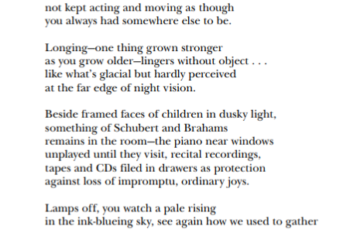Articles/Essays – Volume 47, No. 1
Evenings in October
It’s the Schubert piece that does it . . .
tonight you are moved into the dark to come
where white roots are suddenly remembered,
growing beautifully out of soil walls of a cellar
gone half a century . . . white roots
like vague regrets, that perhaps in the end
hold you here . . . not exactly discontent.
Yet with the Serenade come undertones
of all the times you should have stayed still,
should have listened, or waited, or looked,
not kept acting and moving as though
you always had somewhere else to be.
Longing—one thing grown stronger
as you grow older—lingers without object . . .
like what’s glacial but hardly perceived
at the far edge of night vision.
Beside framed faces of children in dusky light,
something of Schubert and Brahams
remains in the room—the piano near windows
unplayed until they visit, recital recordings,
tapes and CDs fi led in drawers as protection
against loss of impromptu, ordinary joys.
Lamps off, you watch a pale rising
in the ink-blueing sky, see again how we used to gather
on large boulders still warm in the cooling dark
as the lake went violet-silver those summer nights.
The drifting moon seems thin and translucent—
old parchment about to tear; words, too,
casualties of the throat aching and closing
with no animate cause.
You breathe a long breath, try to attend
the exquisite themes of Schubert, instantly recalling
how some beauty widens so close to pain
one might try to avoid it,
how once as a child in the moonlit dark
you chose a route more closed and sinister
through wind-stirred pines, passing by the open luster
of fields
to walk the long way home.


 Back to full Issue
Back to full Issue

